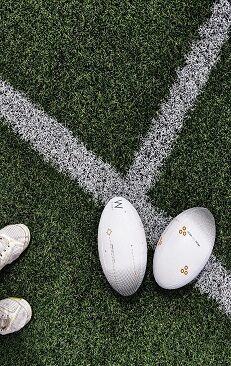Fast-paced, high-impact and skilful, there’s no doubt that rugby is an exciting game, both to spectate and to play. However, while the physical nature of rugby makes it thrilling, it’s also injury-prone. In 2019-20, match injury incidence within Premiership Rugby was 88 injuries per 1000 hours of play – that’s around two injuries per club per match.
If you play rugby regularly, whether professionally or as a hobby, you may believe that injury is inevitable. While that may be true, there are options available to lessen your pain and suffering following a serious injury.
With support from knowledgeable personal injury solicitors, you may be eligible to seek compensation for a rugby injury caused by negligence. In this handy guide, we run through common rugby injuries and the process for making a personal injury claim.
What can cause injury in rugby?
As rugby is a contact sport, it goes without saying that you may get hurt. Whether from a tackle gone awry or a stray ball hitting you in the head, there are numerous physical causes of injury during a rugby match.
Whilst many rugby injuries are the result of an accident where nobody else was to blame, once in a while, an injury can be sustained due to negligence by a third party – be it another player, an official or even the rugby club, itself. If someone else was negligent, you may be eligible to make a personal injury claim.
Common Rugby Injuries
It’s common knowledge that rugby has a high injury rate. Common rugby injuries could result from a one-off incident, such as a poorly timed tackle, an illegal spear tackle, or a blow to the head when contesting for the ball. However, they may also arise from the long-term, continuous playing of the game.
Some common examples include:
- Head or brain injuries and concussions;
- Broken or dislocated bones;
- Overuse injuries in your muscles;
- Paralysis, temporary or permanent;
- Sprains, strains, torn or pulled muscles; or
- Spinal injuries or nerve damage.
The list could go on, but it’s not only players who have to worry about injuries. Spectators and bystanders may also be seriously injured whilst they’re on the rugby grounds, such as taking a hard hit from a ball or tripping over a loose paving slab.
What injuries can be claimed for?
When making a potential personal injury claim for a rugby injury, there are three key factors that you’ll need to be able to prove:
- You were owed a duty of care;
- The defendant did not fulfil that duty of care and was negligent; and
- That negligence caused the incident leading to your injury.
In short, your rugby injury must have occurred because someone failed to act in the manner expected of them.
Who is considered liable?
The Rugby Football Union (RFU) publishes a code of conduct that sets the expected standards for gameplay. Under these guiding principles, “Players have an obligation to ensure they do not cause injury to opponents”. Any injury resulting from deviation from these rules may qualify for compensation.
In most cases, the liable person or party could be one of the following:
- A rugby player, spectator or official;
- The party who organised the match or training session; or
- The owner or occupier of the grounds where the injury occurred.
The party who’s ultimately considered liable for an injury may differ depending on whether it was sustained during a professional or amateur game.
In a professional game, players are employed by their rugby club, which means that the employer may be vicariously liable for the actions of their employee, or that a player can pursue a claim against their employer. With amateurs, it may still be possible to pursue a claim directly against the player.
If a player’s actions were considered a criminal act, such as in the case of assault, then a claim may be made through the Criminal Injuries Compensation Authority.
Where a club failed to properly maintain the site leading to an injury, the injured party may be eligible to make a compensation claim under the principle of “occupier’s liability”.
What evidence will I need?
To make a successful rugby claim, you’ll need to demonstrate that the defendant was negligent and that this negligence caused your pain and suffering. In other words, you’ll need evidence to back up your claim.
Expert personal injury solicitors can support you through the entire process of making a personal injury claim, including the evidence you’ll need to gather. While every case is unique, there are some common types of evidence that will be helpful to prove your case:
- An accident report;
- A medical report;
- Video footage of the incident;
- Photographs of the incident or any visible injuries; and/or
- Witness accounts.
What is the time limit?
Personal injury claims should be started within three years of the day that you learned of your injury or condition. In many cases, this will be the date of the accident or that a medical professional diagnosed you.
Head injuries are common in rugby and it may be that a loved one is unable to claim compensation themselves. In this instance, you may be able to apply to become their litigation friend.
Injuries involving children do not invoke the three-year time limit. A claim can be started by the child’s parent, guardian or litigation friend on their behalf, up until he or she turns 18. Thereafter, the child has until they are 21 years old to make a claim themselves.
Contact Waldrons Solicitors
If you’ve suffered a personal injury, whether from rugby or another sport, get in touch with our expert team of friendly personal injury solicitors at Waldrons Solicitors. We can help you with every aspect of a personal injury claim.
More information on Personal Injury
Last reviewed on 11/07/23 by Joseph Norton who is a Director and Head of Compensation
